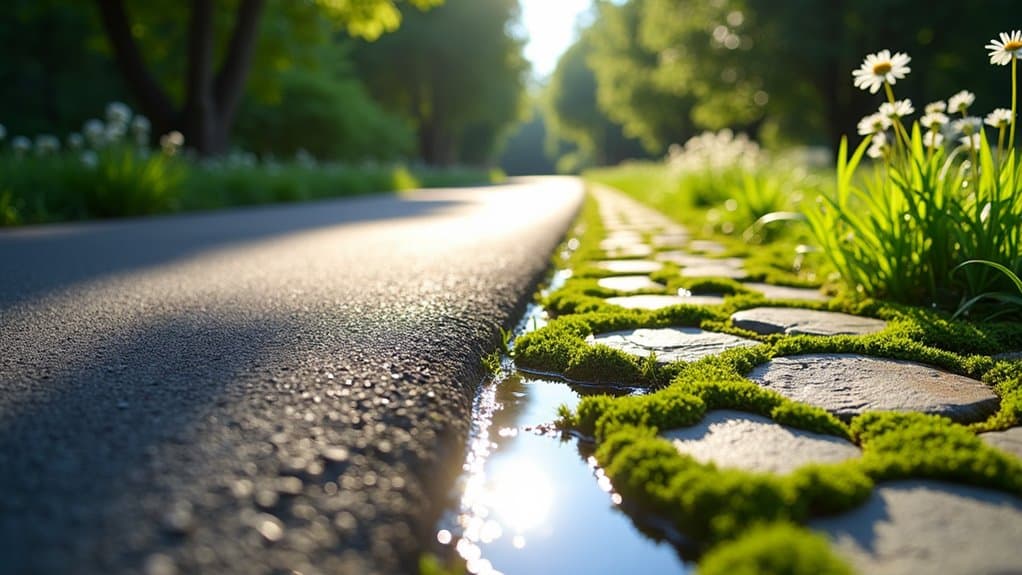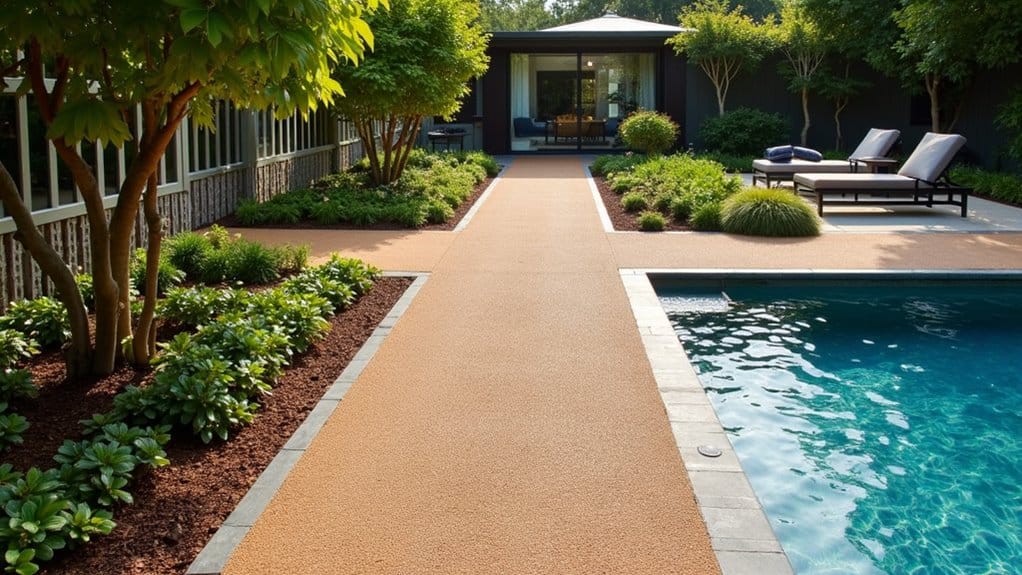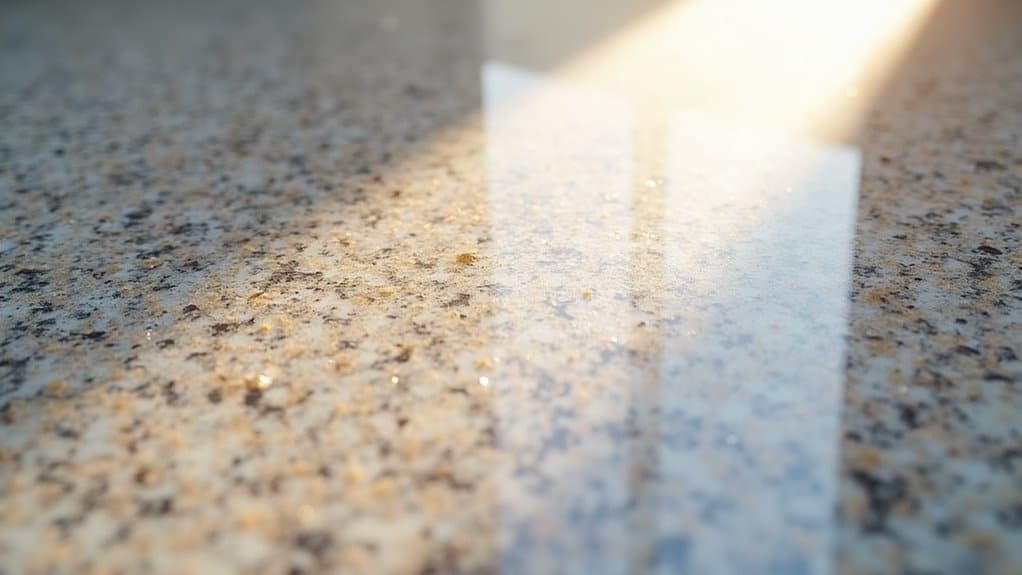When considering permeable driveway options, there are both benefits and drawbacks to keep in mind. On the plus side, these driveways manage stormwater effectively, help recharge groundwater, and can enhance the look of your property.
Gravel driveways are a budget-friendly choice but require regular upkeep. Porous asphalt and concrete allow for high water infiltration but tend to be more expensive and demanding in terms of maintenance. Permeable pavers offer design flexibility but necessitate specialised installation. Stabilised gravel is robust but may suffer from weed growth and can be displaced by snow.
By weighing these factors, you can determine which option best suits your home. Dive deeper to discover the unique features of each choice.
Table of Contents
ToggleKey Takeaways
- Pros: Permeable driveways improve stormwater management by reducing runoff and encouraging groundwater recharge, benefiting local ecosystems.
- Cons: Some permeable options, such as porous concrete, may be susceptible to freeze-thaw cycles and might need regular maintenance.
- Pros: Eco-friendly materials in permeable driveways enhance water quality through natural filtration and help mitigate urban heat island effects.
- Cons: Stabilised gravel can be challenging to maintain, with issues like weed growth and gravel displacement, particularly during snow clearance.
- Pros: Permeable pavers and rubber tiles are durable and offer aesthetic flexibility, making them suitable for various uses while requiring less frequent repairs.
Overview of Permeable Driveways
Permeable driveways are becoming increasingly popular in the UK due to their effectiveness in managing stormwater and enhancing property aesthetics. These driveways use permeable materials that allow water to flow through, reducing runoff and promoting groundwater recharge.
You have various options, including permeable pavers, porous asphalt, and gravel or stone.
Permeable pavers are interlocking units available in different shapes, sizes, and colours, allowing for creative design choices. Their gaps promote water drainage while adding visual appeal.
Porous asphalt, made from larger aggregates, enables water filtration and helps maintain a natural hydrologic balance. High porosity asphalt can effectively reduce surface flooding during heavy rainfall.
For a cost-effective option, gravel or stone driveways offer inherent permeability and a rustic charm. Maintenance is simple, requiring occasional replenishment to keep the surface functional.
Innovative solutions like the BaseCore geocell provide a stable, permeable surface that combines flexibility and strength, making them ideal for contemporary driveways.
Benefits of Permeable Driveways
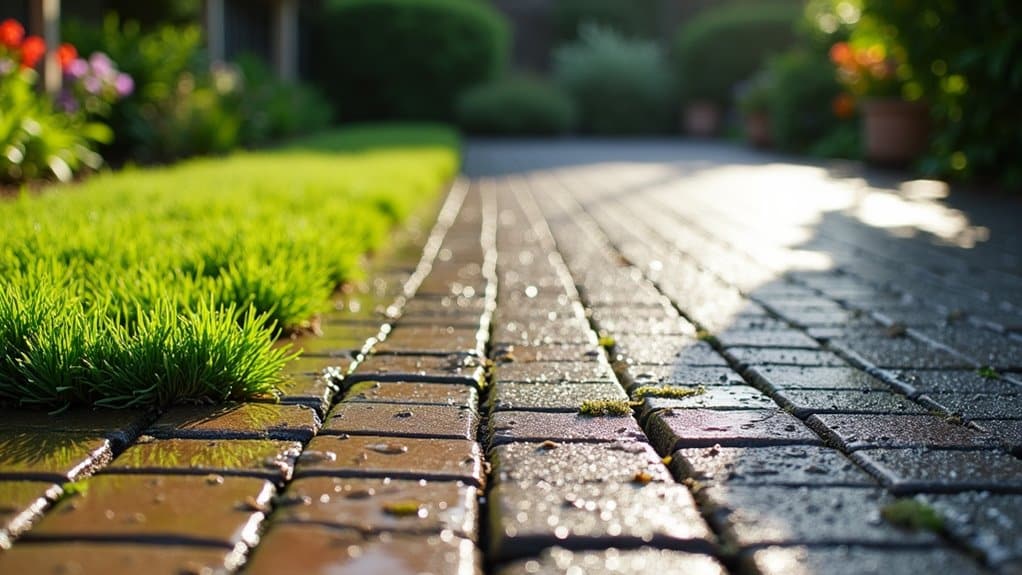
Investing in a permeable driveway offers numerous benefits that extend beyond just looks.
These eco-friendly materials effectively manage stormwater by allowing rainwater to seep into the ground, reducing runoff and the risk of flooding. This practice supports sustainability and helps recharge groundwater, promoting better water conservation. Additionally, permeable driveways incorporate a water filtration system, which helps improve water quality as it infiltrates the ground.
Permeable driveways also help reduce heat, lessening the urban heat island effect and keeping surface temperatures cooler around your home. This can enhance comfort and potentially lower energy bills.
Plus, they come in various designs that allow for landscaping, letting grass and plants flourish within the pavement for added appeal.
Durability is another key benefit; permeable driveways create stable surfaces that require less frequent repairs, making maintenance simple.
They stand up well to both heavy and light traffic and resist weathering, ensuring they last longer.
Gravel Driveways Explained
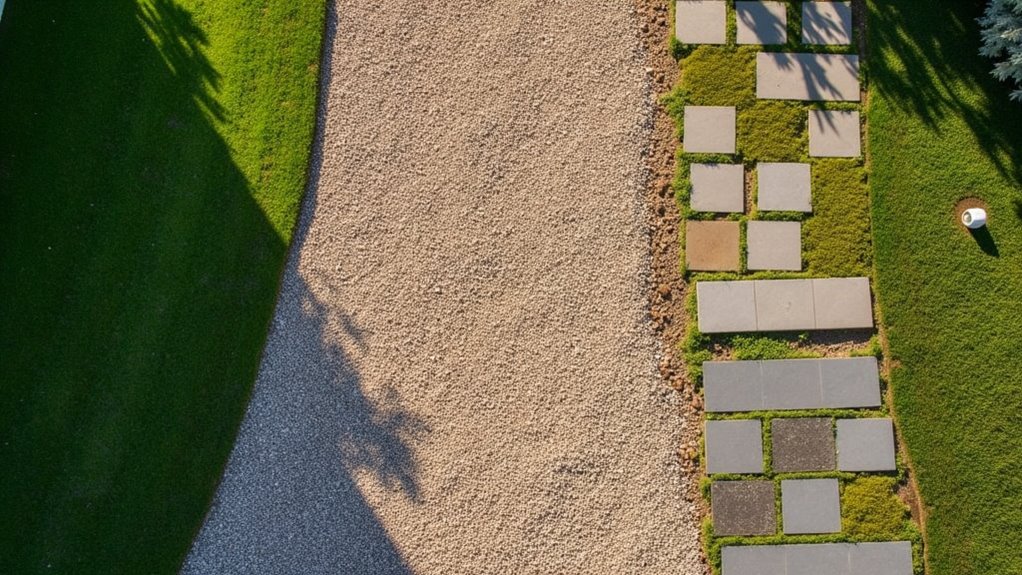
Gravel driveways are a cost-effective option for many homeowners in the UK, thanks to their simple installation process. They require minimal upkeep, allowing you to maintain their appeal with little effort over the years. With proper care, these driveways can last up to 100 years, making them a durable choice for your property.
Cost-Effectiveness and Installation
When choosing a driveway, gravel is often one of the most cost-effective options. Prices range from £10 to £22 per square metre, significantly cheaper than asphalt or concrete, which can cost up to £70 per square metre. Buying gravel in bulk can lead to even greater savings. Additionally, gravel remains one of the cheapest driveway materials available, making it an attractive option for budget-conscious homeowners.
To install a gravel driveway, you’ll need to plan carefully and create layers. Start with a sub-base of 5 to 10 cm to manage water drainage and prevent flooding. A solid sub base with proper thickness requirements is critical for ensuring stability. Use crushed stone for the base layer, followed by a middle layer, and finish with pea gravel or river rock for a smooth appearance. Adding a weed barrier can help maintain a tidy look.
For larger installations, hiring professionals is a smart choice to ensure proper excavation and setup.
Maintenance and Longevity
A well-built driveway not only boosts your property’s curb appeal but also requires regular maintenance to ensure its longevity and functionality. For gravel driveways, understanding how to maintain them is key to keeping the surface in top condition.
| Maintenance Task | Frequency |
|---|---|
| Raking and levelling | Monthly |
| Weed removal | As needed |
| Regrading | Annually |
| Compaction | Every 1-2 years |
To ensure your gravel driveway lasts up to 100 years, promptly address erosion and displacement. Installing a geotextile weed membrane can help control unwanted growth, while effective drainage solutions will prevent water build-up. Additionally, regular maintenance techniques such as jet washing can help keep the surface clean and free from debris. Regular inspections are vital for spotting issues like rutting and potholes early, allowing for quick repairs with extra gravel. Gravel driveways can also be more durable than asphalt or concrete with proper maintenance.
Snow can create its own challenges; it’s wise to leave a thin layer to protect the gravel underneath. By following these straightforward maintenance tips, you can keep your driveway smooth, durable, and visually appealing for years to come. Remember, a little effort in gravel maintenance goes a long way in extending your driveway’s lifespan.
Benefits of Gravel Driveways
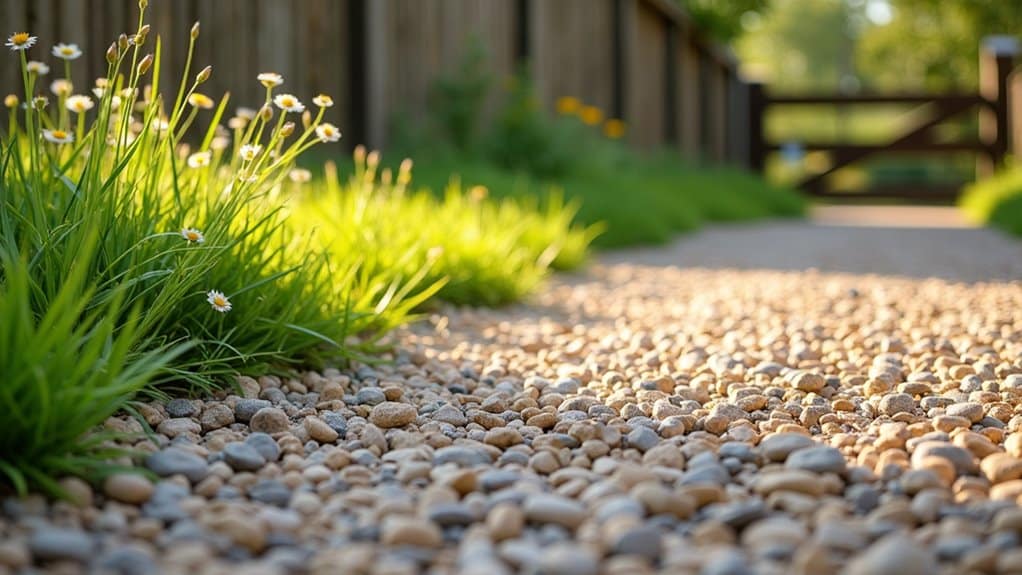
Gravel driveways are a cost-effective option for homeowners in the UK. The installation typically costs about half that of tarmac, allowing you to make the most of your budget.
Maintenance is also minimal, meaning ongoing costs are lower. Plus, you can take on the installation yourself, saving on labour expenses.
Beyond being economical, gravel driveways add character to your property. With a range of colours, sizes, and textures available, you can create a look that complements your home’s design.
The rustic charm of gravel provides a natural aesthetic that many find appealing.
Durability is another key benefit; with proper maintenance, a gravel driveway can last up to 60 years. It’s easy to refresh by simply adding more gravel when needed, keeping it both functional and attractive.
Additionally, gravel driveways drain water effectively, contributing to environmental sustainability, making them a smart choice for your wallet and the planet. Furthermore, these driveways support sustainable water management by allowing rainwater to infiltrate the ground, which helps replenish groundwater supplies.
Drawbacks of Gravel Driveways
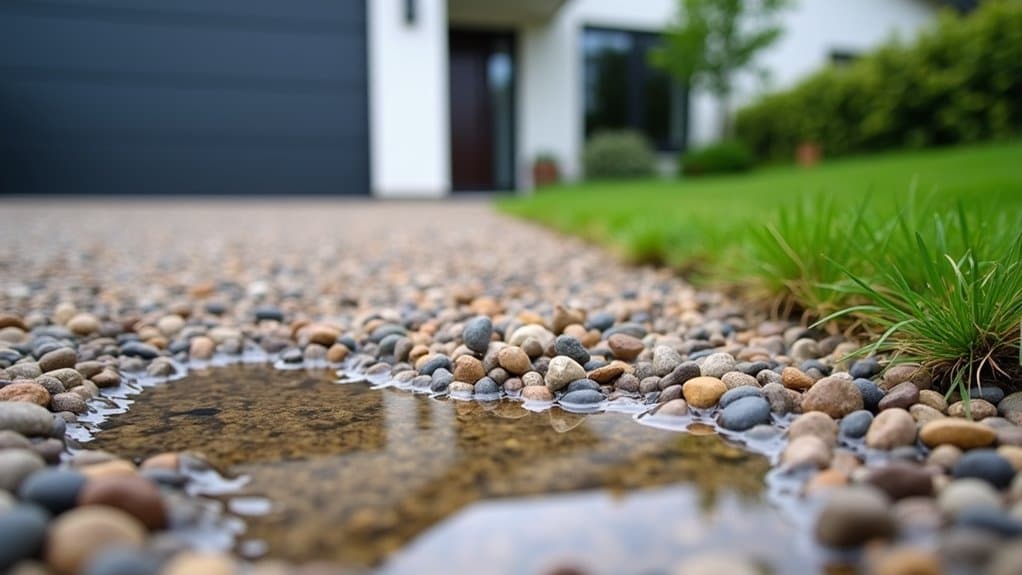
While gravel driveways have a certain rustic appeal, they require a lot of upkeep that can quickly become a hassle.
You’ll often need to rake and regrade the surface to manage erosion and unevenness, especially after heavy rain or snow. Regular maintenance is essential to prevent issues such as potholes and shifting gravel, which can further complicate your driveway care.
Wet weather can wash away the gravel, leaving the underlying ground exposed, which turns your driveway into an ongoing maintenance project rather than a finished space.
Maintenance Requirements
Maintaining a gravel driveway can be more challenging than many homeowners expect. Regular inspections are crucial; this helps you spot small issues before they become bigger problems.
Seasonal maintenance includes raking and redistributing gravel to keep the surface level and prevent ruts. If potholes develop, deal with them promptly by digging out the damaged area and filling it with fresh gravel, ensuring you compact each layer for added strength.
Ideally, you should top up with new gravel at least once a year, or more frequently if your driveway experiences heavy traffic or severe weather. Pay attention to drainage; ensure your driveway has a proper crown and consider installing extra drainage trenches to reduce erosion during heavy rain or snowmelt.
As gravel can wash away, be prepared for material displacement, which will require regular edging and upkeep. Using weed control fabric can help manage unwanted growth, while consistent raking keeps the driveway looking tidy.
If the maintenance becomes too much, hiring professionals for significant tasks like regrading or adding new layers can save you time and effort. Remember, maintaining your gravel driveway requires ongoing attention, but the results will be worthwhile.
Climate Suitability Issues
When considering a gravel driveway, it’s crucial to understand how climate can affect its performance and durability. Gravel driveways can face various challenges depending on the weather, which impacts their sustainability and environmental benefits.
Here’s a summary of potential climate issues:
| Weather Condition | Challenges | Maintenance Needs |
|---|---|---|
| Snowy Weather | Hard to clear; requires manual effort; melting snow can wash away gravel. | Regular replenishment; careful snow shovelling. |
| Heavy Rain | Gravel can wash away; ruts may form; exposed ground is common. | Frequent refilling; measures for stabilisation. |
| Extreme Temperatures | Gravel may shift; expansion and contraction can cause issues. | Ongoing monitoring and adjustments. |
| General Instability | Potholes and uneven surfaces can damage vehicles. | Routine maintenance is essential for safety. |
In areas with extreme weather, gravel driveways can quickly become unstable. The ongoing need for repairs and the risk of gravel displacement diminish the environmental benefits that gravel might initially offer. If you live in a region with significant weather fluctuations, you may find that gravel driveways are not the best option for you.
Porous Concrete and Asphalt
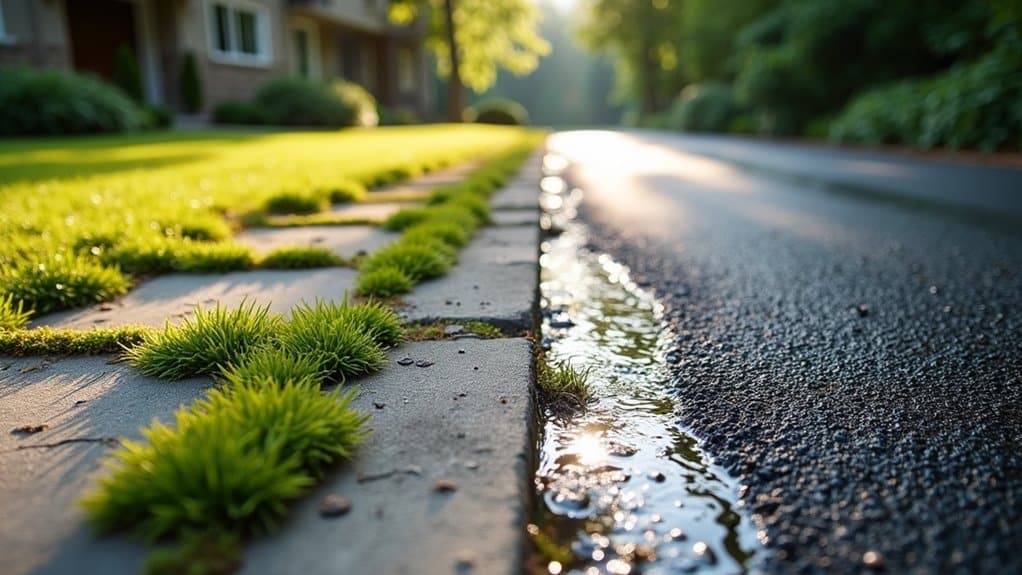
Porous concrete and asphalt are innovative materials designed to manage stormwater effectively, providing homeowners with an eco-friendly alternative to traditional paving.
These porous surfaces allow water to seep through, aiding in drainage and filtering contaminants from runoff. However, they do have some drawbacks.
Porous concrete tends to be more expensive per square metre compared to traditional options and requires regular maintenance to keep its pores clear of debris.
It’s not suitable for heavily trafficked areas, making it less ideal for busy household driveways. Additionally, DIY installation can be challenging due to the need for thicker slabs and careful planning.
Porous asphalt, on the other hand, is effective at managing stormwater and performs well in colder climates.
However, installation costs are higher because it requires a stone recharge bed. Like porous concrete, it also needs maintenance to prevent clogging, which can reduce its effectiveness.
Furthermore, its strength limitations mean it’s not suitable for heavy loads, restricting its use in certain applications.
Benefits of Porous Concrete
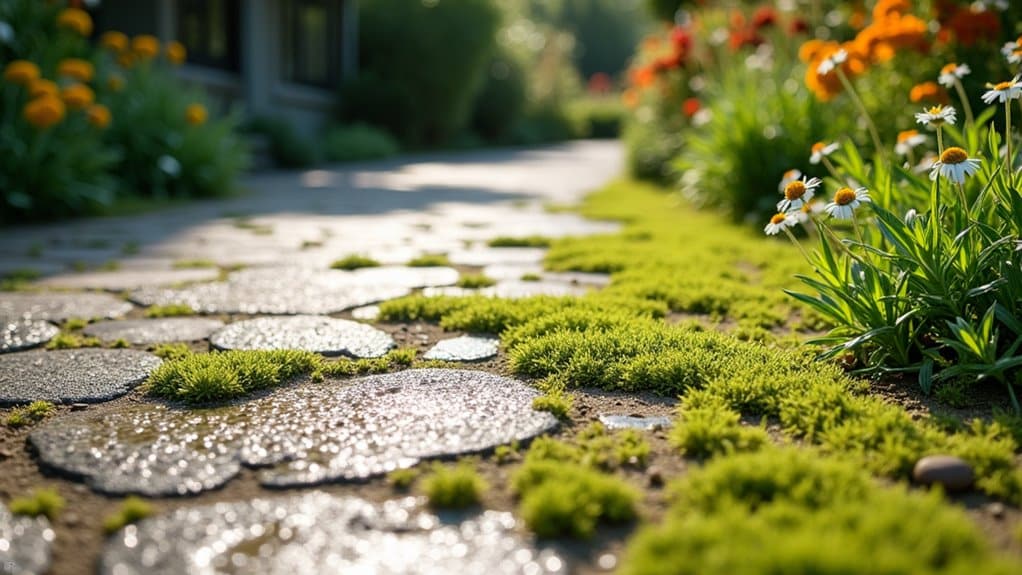
A permeable driveway made from porous concrete offers numerous advantages beyond just looks. It effectively manages stormwater, allowing up to 80% of annual runoff to infiltrate. This reduces peak runoff velocity and volume, easing the burden on drainage systems. Additionally, porous concrete filters stormwater, removing contaminants and aiding in groundwater recharge.
When choosing materials and designs, porous concrete stands out as a sustainable option for residential, commercial, and industrial use. It lessens the need for extensive stormwater management systems, potentially lowering project costs. By reducing the urban heat island effect, it also contributes to a healthier environment.
Moreover, this material supports LEED credits, promoting sustainable building practices. It effectively removes up to 65% of undissolved nutrients and 95% of sediment from runoff, protecting waterways and enhancing local ecosystems.
Investing in a porous concrete driveway not only improves your property’s functionality but also supports long-term sustainability and environmental health.
Drawbacks of Porous Concrete
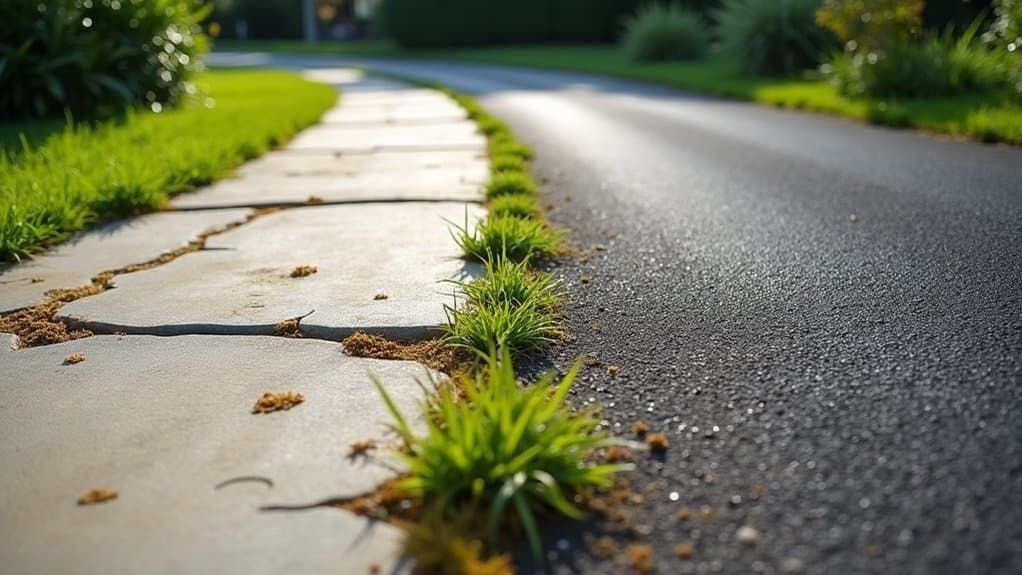
When considering porous concrete for your driveway, be aware that the initial installation costs are higher than those for traditional surfaces.
You’ll also need to think about ongoing maintenance to prevent clogging, which can significantly reduce its permeability.
Moreover, the material is sensitive to weather conditions, especially freeze-thaw cycles, which can lead to increased wear and tear over time.
Initial Installation Costs
Initial Installation Costs of a Permeable Concrete Driveway****
Installing a permeable concrete driveway can lead to significant initial costs that may surprise homeowners. While the environmental benefits are appealing, the financial implications can be daunting.
Here are some key installation challenges and their cost considerations:
- Material Costs: Pervious concrete typically ranges from £8 to £16 per square foot, while permeable pavers can cost between £4 and £12.
- Labour Expenses: A considerable portion of your budget will go towards labour, especially for porous asphalt installations, which can add thousands to your total cost.
- Preparation and Base Layers: Additional expenses may arise from preparing the base, which could require gravel or sand, potentially adding £1 to £45 per tonne, depending on your specific requirements.
- Overall Installation Budget: For a 640-square foot driveway, you could face costs ranging from £2,820 to over £11,520, significantly higher than traditional concrete options.
These factors highlight that while permeable driveways offer substantial advantages, the upfront investment can be a considerable hurdle that necessitates careful planning and budgeting.
Clogging Maintenance Needs
Clogging is a major concern for homeowners with permeable concrete driveways, as it can significantly affect their functionality and lifespan. The design and construction of your driveway are vital in preventing clogging issues. Poor design choices, such as incorrect placement of filter fabric or inadequate drainage, can lead to serious problems.
Additionally, selecting the right grade of concrete is essential for optimal performance over time.
To keep your driveway in top condition, implement effective clogging prevention strategies. Regular maintenance is crucial; consider jet washing or using an industrial vacuum to clear away dirt and debris that can obstruct water flow.
Scheduling these maintenance tasks regularly will help ensure your driveway remains functional.
It’s important to educate yourself and your landscaper about these practices. Conducting regular inspections allows you to spot potential clogging issues early, enabling you to address them before they worsen.
Weather Sensitivity Issues
Weather sensitivity issues can create notable challenges for homeowners considering porous concrete driveways. While these driveways offer advantages, they’re susceptible to environmental factors that may lead to expensive repairs.
- Freeze/thaw effects: In colder regions, repeated cycles of freezing and thawing can cause spalling, which undermines the driveway’s structure.
- Water infiltration: For porous concrete to work properly, it must be laid on soil with good drainage. High water tables or poor drainage can lead to problems, especially during heavy rainfall.
- Erosion: Although porous systems help reduce runoff, choosing the wrong site—such as steep slopes—can heighten the risk of erosion, resulting in more maintenance issues.
- Climate considerations: It’s crucial to consider local weather patterns. Heavy winter gritting can block joints, while areas with high pollution levels may face risks of groundwater contamination.
Permeable Pavers Overview
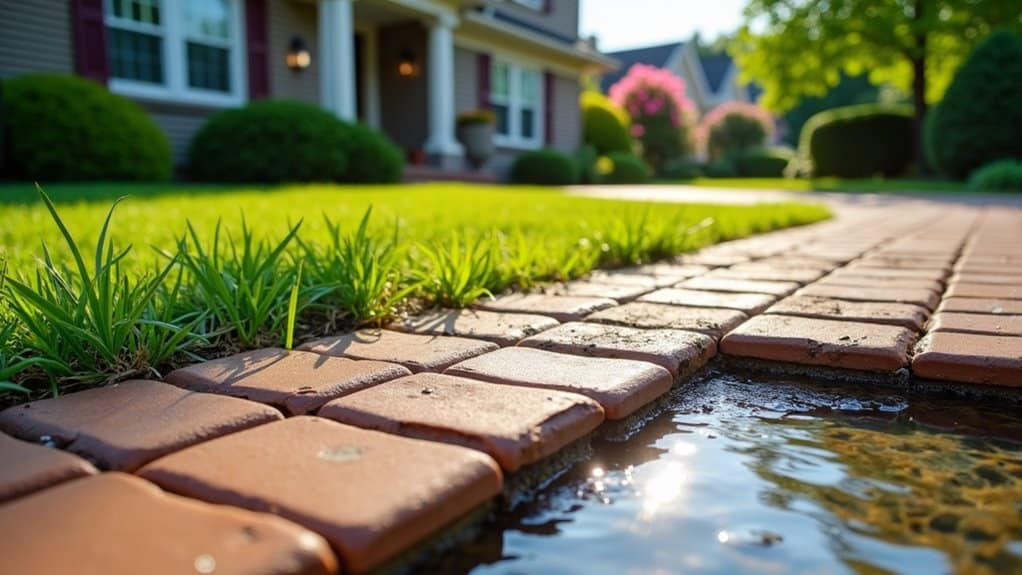
When looking for sustainable driveway options, permeable pavers are an excellent choice due to their design and environmental advantages. These pavers are made from materials that allow water to pass through, helping to manage stormwater and minimise runoff. You can select from various types, such as turf blocks, interlocking pavers, and permeable asphalt, each offering distinct looks and functionalities.
Design considerations are crucial when choosing permeable pavers. It’s important to evaluate the load-bearing capacity your driveway will need to ensure the materials can handle the expected traffic.
Planning the layout is key as it affects both aesthetics and drainage efficiency. Proper site preparation is essential, which involves excavating to the correct depth and laying a geotextile fabric to separate the soil from gravel, improving durability and performance.
When installing the pavers, ensure the surface is flat and even to prevent water pooling. Regular maintenance is vital; using a vacuum truck to remove debris and pollutants will keep your permeable driveway in top condition.
Benefits of Permeable Pavers
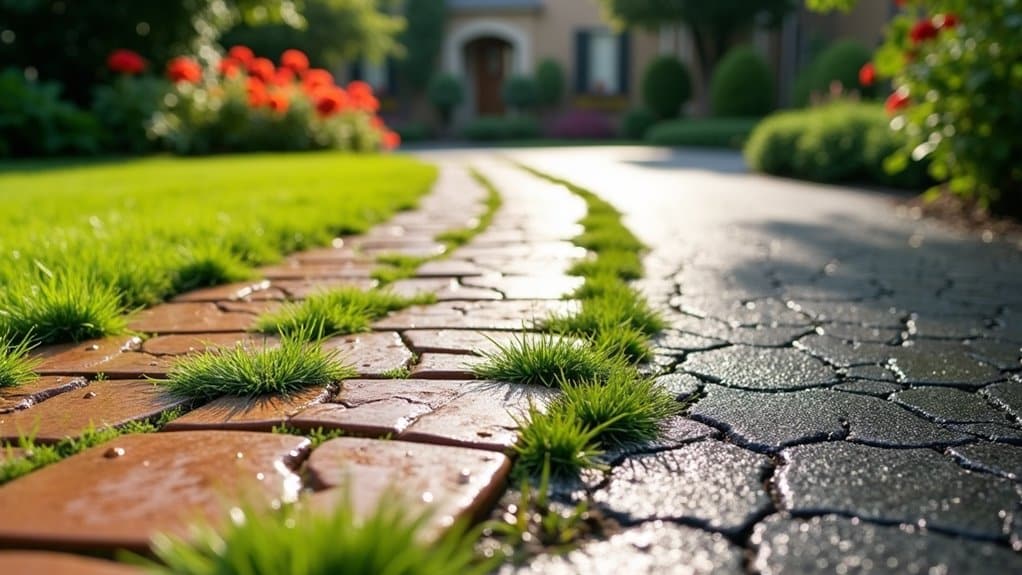
Permeable pavers not only improve the look of your driveway but also provide several benefits that support environmental sustainability and practicality.
These innovative materials allow for effective drainage while fostering a healthier ecosystem. Here are four key advantages to consider:
- Reduces Surface Water Runoff: By enabling water to seep through, they decrease runoff volume, helping to prevent localised flooding.
- Natural Filtration: As rainwater filters through the pavers, contaminants are removed, enhancing water quality before it reaches the groundwater.
- Mitigates Urban Heat: Permeable pavers help keep the ground cooler, reducing the urban heat island effect and improving air quality.
- Supports Groundwater Recharge: These pavers promote the infiltration of water back into the soil, replenishing aquifers and ensuring a sustainable water supply.
With their durability and design flexibility, permeable pavers meet both aesthetic preferences and contemporary environmental standards.
Choosing permeable pavers is a practical step towards a more sustainable outdoor space.
Drawbacks of Permeable Pavers
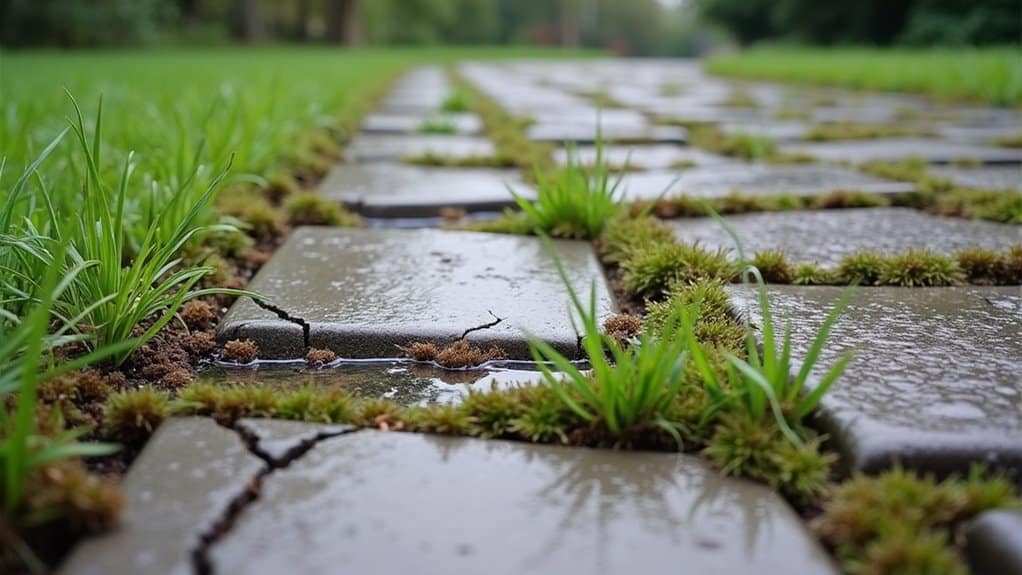
While permeable pavers come with several benefits, it’s important to consider their drawbacks before proceeding. One major downside is the higher initial cost. You’ll need to invest in specialised materials and skilled labour, which can make installation pricier than traditional options. Additionally, proper subgrade preparation and aggregate materials can further inflate these upfront expenses.
Maintenance is another critical factor. To avoid clogging, regular upkeep is necessary to clear away debris and dirt that accumulate in the gaps. Repairs can also be complicated and costly, especially in colder regions where freeze-thaw cycles can damage the pavers.
Performance limitations are worth noting as well. If you’re looking at high-traffic areas or heavy-load applications, permeable pavers mightn’t be the best choice. Their load-bearing capacity is generally lower than that of conventional pavers, and they can struggle in areas with high sediment loads or groundwater contamination risks.
Lastly, installation can be challenging. The complexity of the necessary drainage layers requires expertise and specialised equipment.
Plus, with fewer design options available, you might find that some styles don’t meet your aesthetic preferences, limiting your choices.
Stabilized Gravel With Plastic Pavers
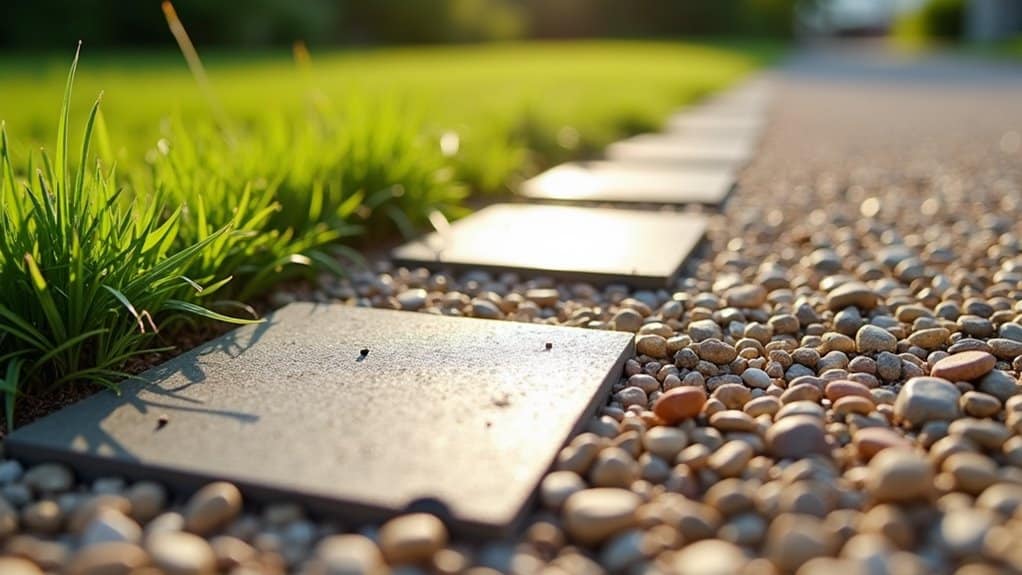
Stabilised gravel with plastic pavers is an excellent choice for those looking for an effective and eco-friendly driveway solution. This system combines durability with aesthetic appeal, making it a popular option for homeowners.
Here’s what you can expect:
- Material Strength: Most pavers are constructed from recycled plastic, ensuring they last for years.
- Design Flexibility: You can fill the pavers with various types of gravel, allowing for a personalised look for your driveway.
- Drainage Efficiency: The permeable design helps manage water flow, reducing puddles and runoff.
- Low Maintenance: After installation, you’ll find minimal upkeep is required.
To install, start by excavating the area, laying down a geotextile fabric, positioning the pavers, filling them with gravel, and compacting the surface.
This method enhances load-bearing capacity and prevents soil mixing, ensuring stability. With the right installation, you’ll have a driveway that’s both functional and visually appealing, all while being environmentally friendly.
Benefits of Stabilized Gravel
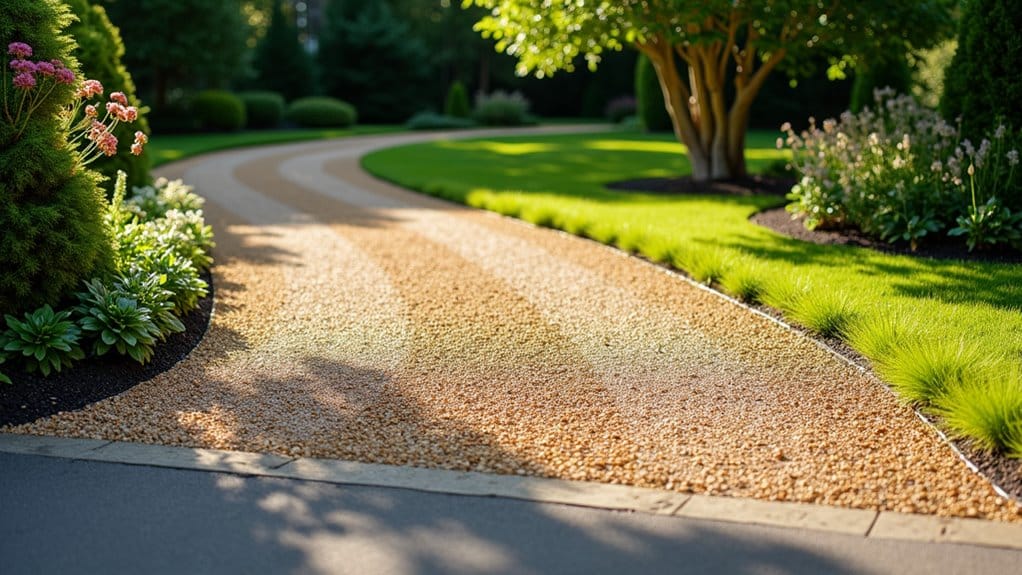
Opting for stabilised gravel for your driveway means you’re choosing a surface that offers excellent stability and durability, capable of supporting heavy vehicles without shifting.
This material creates a reliable surface for both cars and pedestrians, while also being environmentally friendly, as it allows rainwater to soak into the ground, helping to replenish local aquifers.
With little maintenance needed, stabilised gravel can last for decades, making it a practical and sustainable choice for your home.
Enhanced Stability and Durability
A well-designed stabilised gravel driveway significantly enhances stability and durability, making it an excellent choice for homeowners looking for long-lasting solutions. By using gravel mats or plastic grid pavers, you can ensure your driveway remains structurally sound and attractive.
Here are some key benefits of these enhancements:
- Prevention of Gravel Shifting: The mats stop loose gravel from moving or sinking, keeping the surface level.
- Reduced Tyre Rut Formation: With better load-bearing capacity, you’ll see fewer ruts and sliding, even with heavy traffic.
- Weed Barrier: Gravel mats act as a barrier against weeds, reducing your maintenance efforts.
- Durable Construction: Interlocking honeycomb-celled panels with geotextile backing provide strength, ensuring your driveway can handle heavy loads.
With these features, you’ll enjoy a driveway that not only looks good but also performs reliably over time.
Investing in stabilised gravel extends the lifespan of your driveway, allowing it to handle daily use while keeping maintenance costs low.
Environmental Impact Reduction
Permeable gravel driveways are a sustainable choice that significantly reduces environmental impact. By using locally sourced materials, you cut down on the need for resource-heavy quarried aggregates. This not only lowers carbon emissions linked to mining and transport but also reduces the environmental damage often associated with construction.
It’s a practical approach that balances economic needs with environmental care.
These permeable surfaces also help manage stormwater runoff effectively, allowing for natural filtration and groundwater recharge. This process improves soil health and supports local vegetation, fostering a vibrant urban ecosystem.
In contrast, traditional paving methods rely on fossil fuels, which contribute to greenhouse gas emissions and increase heat absorption, worsening issues like urban heat islands.
Permeable driveways, on the other hand, often incorporate recycled materials, minimising waste and your overall environmental footprint.
Drawbacks of Stabilized Gravel
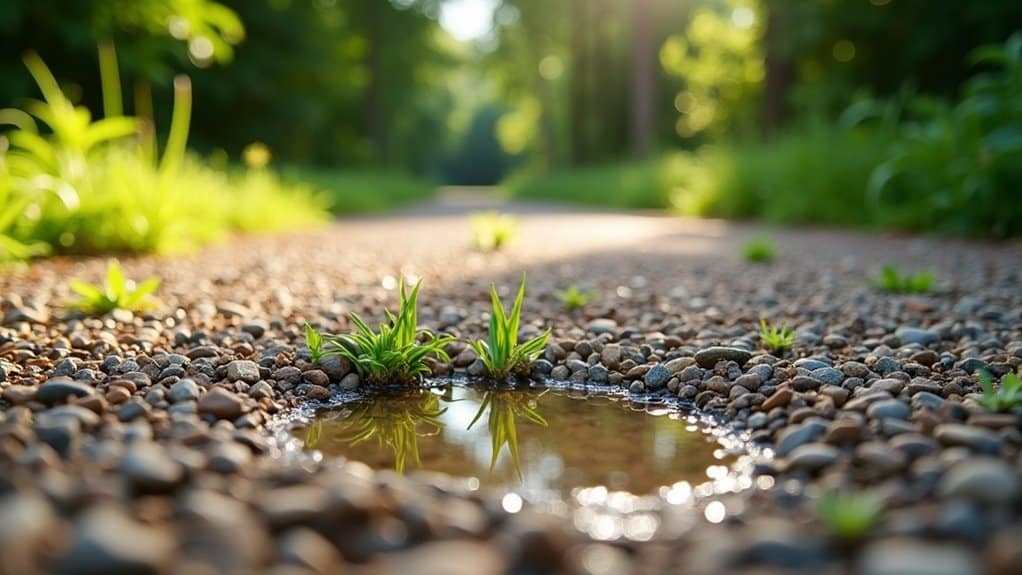
Stabilised gravel driveways might seem appealing at first, but they come with several drawbacks that can affect both functionality and appearance.
While they may be initially cost-effective, the challenges they present, particularly in adverse weather conditions, can be significant.
Here are some key issues to consider:
- Snow Removal Challenges: Clearing snow can displace the gravel, making it difficult to maintain a level surface.
- Ruts and Potholes: The combination of vehicle traffic and harsh weather often leads to unsightly ruts and potholes.
- Gravel Displacement: Heavy rain can wash away gravel, leaving bare patches that require frequent attention.
- Weed Growth: The spaces between gravel stones are perfect for weeds, necessitating ongoing control efforts.
These issues underscore the maintenance demands of stabilised gravel compared to other driveway options.
Regular raking, filling potholes, and replenishing gravel are essential to keep your driveway in good condition.
If you prioritise durability and a neat appearance, it may be wise to consider alternatives to stabilised gravel.
Rubber Driveway Tiles Overview
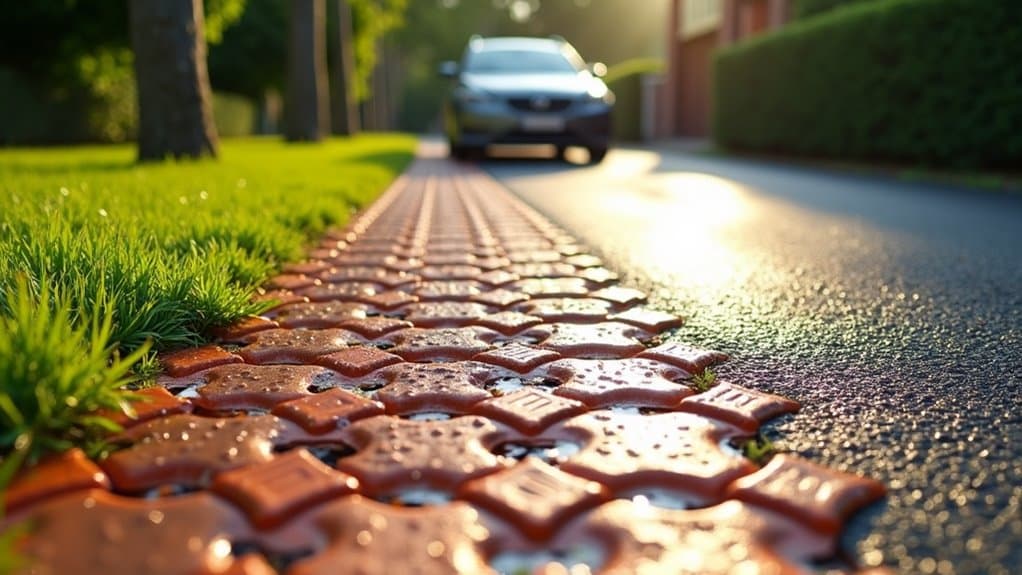
When looking for a driveway option that offers durability and low maintenance, rubber driveway tiles stand out as a practical choice. These tiles provide numerous benefits, including excellent impact protection and anti-slip features, making them a safer alternative to traditional concrete pavers. Their built-in drainage channels ensure quick and effective water removal, reducing the risk of pooling and associated hazards.
Made from robust SBR (Styrene-Butadiene Rubber), rubber driveway tiles can endure extreme temperatures, ranging from -40°C to +80°C. They come in a size of 200mm x 160mm and various thicknesses, making them suitable for a range of environments. Additionally, their sound-absorbing qualities help create a quieter outdoor space.
Rubber tiles are versatile and not just for driveways; they can be used for patios, garages, walkways, and even commercial areas like stables and playgrounds. The easy interlocking design makes installation straightforward, while maintenance is minimal, requiring only regular cleaning and occasional resealing to protect against UV damage.
Choosing rubber driveway tiles means investing in a durable, versatile, and low-maintenance solution that enhances safety and appearance.
Frequently Asked Questions
How Do Permeable Driveways Affect Property Drainage?
Permeable driveways improve drainage by allowing water to soak into the ground, which enhances stormwater management. This reduces surface runoff and lowers the risk of flooding, making your property safer. For example, during heavy rain, a permeable driveway can prevent water pooling and direct it naturally into the soil, promoting better water quality in nearby rivers and streams. Overall, this contributes to a healthier environment around your home.
Can I Install a Permeable Driveway Myself?
You can install a permeable driveway yourself, but be mindful of the costs for tools and materials. Using the right techniques is crucial for a successful outcome, so ensure you’re prepared for the time and effort required. For example, if you’re laying permeable blocks, you’ll need a solid base and proper drainage to avoid future issues.
What Maintenance Is Required for Permeable Driveways?
Regular maintenance can extend the lifespan of a permeable driveway by as much as 30%. It’s important to clean it effectively twice a year and address any repairs quickly to prevent blockages and ensure optimal performance. For instance, using a pressure washer can help clear away leaves and debris, keeping the surface functional.
Are Permeable Driveways Environmentally Friendly?
Yes, permeable driveways are environmentally friendly. They use sustainable materials that allow water to seep through, which reduces surface runoff and helps recharge groundwater. This choice not only cuts down on pollution but also supports a healthier ecosystem and encourages sustainable urban development. For example, instead of rainwater running off into drains, it can soak into the ground, benefiting local plants and wildlife.
What Are the Best Climates for Permeable Driveways?
When thinking about permeable driveways, consider the weather and soil drainage. They work best in areas with light to moderate traffic and can perform well in colder climates, as long as the soil underneath allows for good drainage. For example, if you live in a region with heavy rainfall but well-draining soil, a permeable driveway could be a great option.
Conclusion
When selecting a permeable driveway, you’re not just creating a surface; you’re making an environmentally friendly choice that can improve the look and functionality of your property. Consider options like gravel, stabilised gravel, or rubber tiles based on your specific requirements. Each has its own advantages and disadvantages, so it’s essential to evaluate them carefully. In the end, you’ll discover a solution that suits your style while supporting effective water management in your garden.
Prepare the perfect base for your resin bound stone installation and discover the crucial factors that ensure lasting durability.
Know where resin bound surfacing can transform spaces for both residential and commercial use, and discover the countless benefits that Read more
A stone carpet combines beauty and resilience in flooring, but what makes quartz floors uniquely beneficial? Discover the secrets behind Read more

